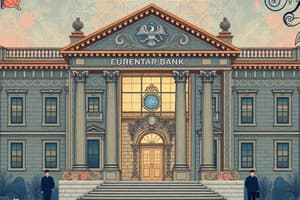Podcast
Questions and Answers
How do central banks govern the banking industry? (Select all that apply)
How do central banks govern the banking industry? (Select all that apply)
- By responding quickly to banking crises that occur (correct)
- By deciding how much banks must keep in reserve (correct)
- By supervising the loan process at banks
- By auditing banks based on current regulations (correct)
- By printing money for distribution to banks
- By overseeing the nation's payment system (correct)
Based on the diagram of the circular flow model, which example describes how a bank injects money into the economy?
Based on the diagram of the circular flow model, which example describes how a bank injects money into the economy?
- A bank buys a company's rapidly growing stock
- A bank buys property in a bustling business district
- A bank approves a mortgage for a customer (correct)
- A bank opens a savings account for a customer
Banks pay interest to customers through which type of account?
Banks pay interest to customers through which type of account?
- Savings account (correct)
- 401k account
- Credit card account
- Mortgage account
Which are the roles of a bank? (Select all that apply)
Which are the roles of a bank? (Select all that apply)
In what year did consumers get the best deal on a mortgage according to the graph?
In what year did consumers get the best deal on a mortgage according to the graph?
An entrepreneur who needs money to create and distribute a new invention would most likely visit which type of banker?
An entrepreneur who needs money to create and distribute a new invention would most likely visit which type of banker?
Bank deposits help the nation's economy by:
Bank deposits help the nation's economy by:
Which statement best describes the effects of low and high interest rates on the economy?
Which statement best describes the effects of low and high interest rates on the economy?
Banks make the most money and take the most risk with an interest rate of:
Banks make the most money and take the most risk with an interest rate of:
What explains the difference between retail and commercial banking?
What explains the difference between retail and commercial banking?
An entrepreneur who needs large amounts of capital to create and distribute a new invention would most likely visit which type of banker?
An entrepreneur who needs large amounts of capital to create and distribute a new invention would most likely visit which type of banker?
The Federal Reserve Bank of the United States is also known as the:
The Federal Reserve Bank of the United States is also known as the:
Which is the correct order of entities who benefit when banks make a profit?
Which is the correct order of entities who benefit when banks make a profit?
Which best explains why banks consider interest on loans to be important?
Which best explains why banks consider interest on loans to be important?
Flashcards are hidden until you start studying
Study Notes
Central Banks and Governance
- Central banks govern the banking industry by determining reserve requirements for banks.
- They oversee the national payment system to ensure efficient transactions.
- Rapid responses to banking crises are crucial for maintaining economic stability.
- Regular audits of banks are conducted to ensure compliance with regulations.
Banking and Money Flow
- A bank injects money into the economy primarily through mortgage approvals for customers.
Interest and Savings
- Banks pay interest to customers via savings accounts; they do not do so through credit cards or 401k accounts.
Roles of Banks
- Banks are responsible for storing and holding money, lending to individuals and businesses, and investing in the economy.
Mortgage Interest Rates
- The year 1978 offered the best mortgage deals for consumers, indicated by lower interest rates.
Entrepreneurial Funding
- Entrepreneurs seeking funding for new inventions commonly approach investment bankers.
Economic Impact of Bank Deposits
- Bank deposits are crucial as they give banks the liquidity required to loan and invest, stimulating economic growth.
Interest Rates and Economic Behavior
- Low interest rates typically encourage consumer borrowing and spending, while high interest rates promote saving.
Risk and Profit in Banking
- Banks maximize profits and assume greater risks at higher interest rates, such as 18%.
Banking Types
- Retail banks primarily serve small businesses, whereas commercial banks cater to large corporations for loans.
The Federal Reserve
- The Federal Reserve Bank acts as the central bank of the United States, playing a significant role in monetary policy.
Beneficiaries of Bank Profits
- When banks profit, the beneficiaries include shareholders, companies, and the broader economy.
Importance of Loan Interest
- Interest on loans is vital for banks as it helps cover operational costs and maintain profitability.
Studying That Suits You
Use AI to generate personalized quizzes and flashcards to suit your learning preferences.



